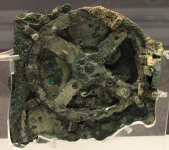Menu
Install the app
How to install the app on iOS
Follow along with the video below to see how to install our site as a web app on your home screen.
Note: This feature may not be available in some browsers.
You are using an out of date browser. It may not display this or other websites correctly.
You should upgrade or use an alternative browser.
You should upgrade or use an alternative browser.
1 - 11 of 11 Posts
My favorite invention that the ancient Greeks created is democracy! 

efhernandez_
Active member
Woah...I can't believe they have the original one, so coolOk, as an engineer, especially one that is particularly interested in computers, my favourite invention is the Antikythera mechanism which is on display in the National Archaeological Museum in Athens.
View attachment 775
Blue & White
Member
Avgolemono soup
francescool
Active member
The fire pump!!
k_tsoukalas
Administrator
Yess!! It's the best, so good.Avgolemono soup
The Antikythera Mechanism is also a truly remarkable invention.
I didn't know Greeks invented the windmill? I do know that some of my best photographs taken in Greece have involved windmills.
Blue & White
Member
The Greeks invented everything, directly or indirectlyYess!! It's the best, so good.
The Antikythera Mechanism is also a truly remarkable invention.
I didn't know Greeks invented the windmill? I do know that some of my best photographs taken in Greece have involved windmills.
nm1999
Active member
True!The Greeks invented everything, directly or indirectly
Vangelis
Active member
For those interested in Ancient Greek inventions, the Museum of Ancient Greek Technology in Athens is a great place to visit.
 kotsanas.com
kotsanas.com
Museum of the Ancient Greek Technology
 kotsanas.com
kotsanas.com
nm1999
Active member
Looks great, thanks for sharingFor those interested in Ancient Greek inventions, the Museum of Ancient Greek Technology in Athens is a great place to visit.
Museum of the Ancient Greek Technology
kotsanas.com
1 - 11 of 11 Posts
JOIN THE DISCUSSION AND READ OTHER GREEK INFO:
History of the Greek flag?
- dpappas87
- Greek History Forum
- Replies: 1
I never really stopped to think about the history of the Greek flag and I want to share that knowledge with my kids. I need to figure out what it is first. I have this feeling the history is rich because I've seen different, older versions of the flag.
Could anyone shed some light on the following aspects:
Could anyone shed some light on the following aspects:
- Origins: When was the Greek flag officially adopted, and were there any significant events that led to its creation?
- Symbolism: What do the colors and the cross represent? Are there any historical or cultural significance behind these elements?
- Evolution: Has the flag undergone any changes throughout the years? If so, what prompted these changes?
- Legends/Myths: Are there any interesting legends or anecdotes surrounding the inception or adoption of the flag?
Studying the Trojan War - Was it Real?
- d_kakavouli
- Greek History Forum
- Replies: 1
Did the Trojan War really happen? I am doing a bit of research and wanted to know what you guys thought:
The war is believed to have happened around 1200 BCE, and while there is no concrete evidence to support its occurrence, it is widely accepted as factual.
What is confusing me is how prevalent it is in Greek Mythology. In addition to the gods' involvement in the conflict, various stories and legends were added over time to give the tale more depth and drama. For example, the character of Achilles was said to be invulnerable except for his heel, which led to the phrase "Achilles heel" being used to describe a person's one weakness.
While some scholars once dismissed the Trojan War as pure myth, modern archaeological evidence has suggested that it may have been a real event. Excavations at the ancient site of Troy have revealed evidence of a long period of conflict and destruction, and historians have found similarities between the tale as it is told in ancient texts and what is known about the region's history at the time. While many details of the Trojan War are still shrouded in mystery, it seems increasingly likely that it was not just a legend but a real event that has been passed down through the ages.
The war is believed to have happened around 1200 BCE, and while there is no concrete evidence to support its occurrence, it is widely accepted as factual.
What is confusing me is how prevalent it is in Greek Mythology. In addition to the gods' involvement in the conflict, various stories and legends were added over time to give the tale more depth and drama. For example, the character of Achilles was said to be invulnerable except for his heel, which led to the phrase "Achilles heel" being used to describe a person's one weakness.
While some scholars once dismissed the Trojan War as pure myth, modern archaeological evidence has suggested that it may have been a real event. Excavations at the ancient site of Troy have revealed evidence of a long period of conflict and destruction, and historians have found similarities between the tale as it is told in ancient texts and what is known about the region's history at the time. While many details of the Trojan War are still shrouded in mystery, it seems increasingly likely that it was not just a legend but a real event that has been passed down through the ages.
Learning about the Spartan way of life
- dimi_pat
- Greek History Forum
- Replies: 1
I find the Spartans fascinating. They seemed to have a different way of life!
The Spartans, known for their military might, also led a lifestyle that was remarkably disciplined and focused on simplicity.
The core of Spartan society was its military-oriented ethos. From a young age, Spartan boys were trained to be soldiers in the agoge, a rigorous education system that emphasized physical training, endurance, and survival skills. This preparation was not just about warfare but about creating individuals who were resilient, self-sufficient, and disciplined.
But Spartan discipline extended beyond the military sphere. Spartans lived a life of austerity and frugality that is quite alien to our modern way of living. Meals were simple, homes were unadorned, and luxuries were frowned upon. This was not out of a lack of resources but a deliberate choice to avoid softness and dependency on material comforts.
Interestingly, this Spartan simplicity also fostered a sense of equality among citizens. By eschewing luxury, Spartans aimed to reduce divisions within their society. Wealth and status were downplayed, while military prowess and moral integrity were valued above all.
What do you guys think about this or what can you add to my thinking?
The Spartans, known for their military might, also led a lifestyle that was remarkably disciplined and focused on simplicity.
The core of Spartan society was its military-oriented ethos. From a young age, Spartan boys were trained to be soldiers in the agoge, a rigorous education system that emphasized physical training, endurance, and survival skills. This preparation was not just about warfare but about creating individuals who were resilient, self-sufficient, and disciplined.
But Spartan discipline extended beyond the military sphere. Spartans lived a life of austerity and frugality that is quite alien to our modern way of living. Meals were simple, homes were unadorned, and luxuries were frowned upon. This was not out of a lack of resources but a deliberate choice to avoid softness and dependency on material comforts.
Interestingly, this Spartan simplicity also fostered a sense of equality among citizens. By eschewing luxury, Spartans aimed to reduce divisions within their society. Wealth and status were downplayed, while military prowess and moral integrity were valued above all.
What do you guys think about this or what can you add to my thinking?
Question about Greece during WWI
- ssherie_
- Greek History Forum
- Replies: 2
I am trying to learn more about Greek history. This is a family project! What I am learning about now is Greece's involvement in WWI. From what I've gathered, Greece had a rather complex and interesting stance during World War I, but I'm looking for more in-depth information.
Could anyone here provide insights or point me towards resources that detail:
Could anyone here provide insights or point me towards resources that detail:
- Greece's political climate leading up to its involvement in WWI.
- The significance of the National Schism and how it affected Greece's participation.
- Key battles or military campaigns that Greek forces were involved in.
Greek Independence Day History
- redsoxdw_
- Greek History Forum
- Replies: 1
Greek Independence Day is coming up! I thought I would share a bit that I know about the history. Please chime in with corrections or anything to add!
- The Spark of Revolution: Greek Independence Day marks the day in 1821 when the Greeks began their revolt against the Ottoman Empire, a state that had controlled Greece for nearly 400 years. This revolt was influenced by the surge of nationalism throughout Europe and inspired by the Enlightenment ideals of liberty, equality, and fraternity.
- A Poet’s Declaration: The revolution officially began after Bishop Germanos of Patras raised the Greek flag at the Monastery of Agia Lavra in Peloponnese, symbolizing the call to arms. However, it was rumored that the war of independence was actually declared a few days earlier by Alexandros Ypsilantis, a Greek national hero, in the Danubian Principalities.
- International Support: The Greek fight for independence was not just a local effort; it garnered substantial international support from prominent figures such as Lord Byron from Britain, who notably spent his own money and later died in Greece, contributing to the Greek cause. This international backing was crucial for the morale of the Greek fighters and helped in diplomatic efforts later on.
- The Battle of Navarino: A pivotal point in the Greek War of Independence was the Battle of Navarino in 1827, where the combined fleets of Britain, France, and Russia defeated the Ottoman and Egyptian fleets. This naval battle marked a significant turning point that led to the eventual independence of Greece.
- Recognition and Autonomy: Greek Independence was formally recognized in 1830 by the Treaty of London. However, full sovereignty and the delineation of the Greek borders were not achieved until later. It allowed the foundation of the modern Greek state, under the governance of King Otto from Bavaria.
Share and discuss Greek history!
WorldwideGreeks.com is a free online forum community where people can discuss Greek food, travel, traditions, history and mythology.
Join Worldwide Greeks here!
Join Worldwide Greeks here!
JOIN COMMUNITY FOR FREE
LOGIN TO YOUR ACCOUNT




